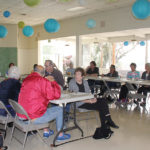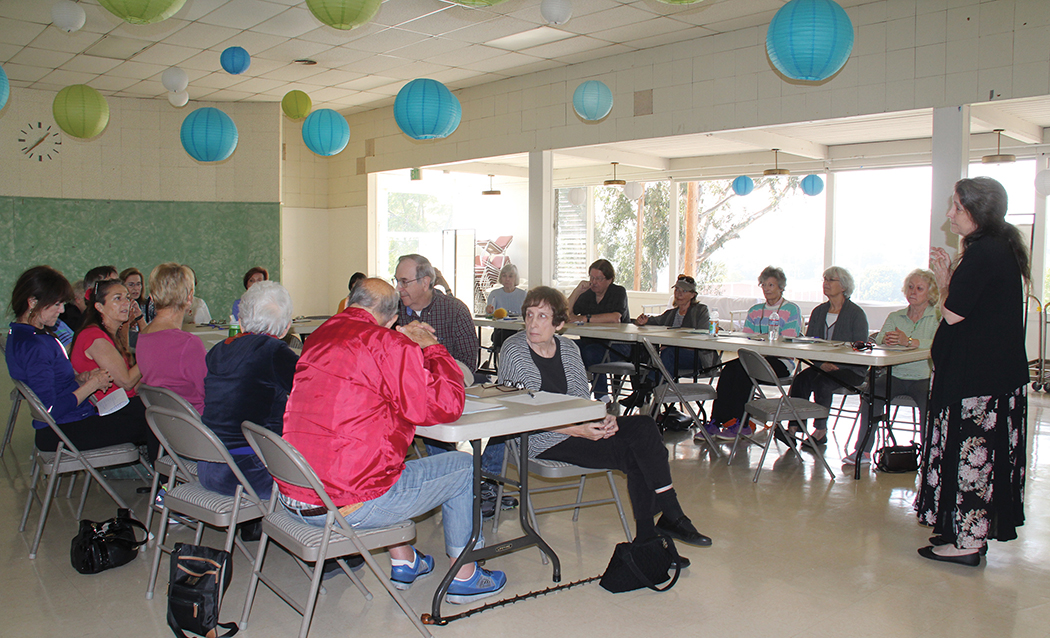By DEBBIE ALEXANDER
Staff Writer
 As an adult struggling with attention deficit disorder, I’m memory challenged. I often ask my family members questions and moments later, repeat them, driving them crazy.
As an adult struggling with attention deficit disorder, I’m memory challenged. I often ask my family members questions and moments later, repeat them, driving them crazy.
I watched the movie Still Alice, for which Julianne Moore won an Academy Award portraying Alice, a linguistics professor about my age who suffers from early-onset Alzheimer’s disease.
And, I keep noticing TV ads for Prevagen, an herbal supplement that allegedly boosts memory. Online games and apps like Luminosity and Trivia Crack make similar claims.
So many options, but what could really work? God knows at 53, I refuse to fall down Alice’s memory hole, or become like my great-grandma Lillie, who suffered from Alzheimer’s.
Then I spotted a small article about a free UCLA Memory Class being held at the Palisades Woman’s Club for four weeks, on Mondays from noon to 2 p.m. I decided to go because my mom took a similar class. Also, my husband Scott, out of desperation ages ago, gave me a copy of UCLA memory guru Dr. Gary Small’s book The Memory Prescription.
Small heads UCLA’s Longevity Center as professor of psychiatry, and his research created techniques used in the class.
At the initial meeting, I joined nearly 40 others, most much older than I. By the end of the course there were about 25 regulars.
The teacher, Monica Dunahee, brings classes to the community through a grant from Jewish Family Services, and the Woman’s Club donates the space.
Dunahee said memory is a broad topic because it can be sensory, short-term and long-term. She stressed the importance of getting information past the first two and into the long-term area because that is where stuff sticks.
Therefore, paying attention is a key component of successful long-term memory-building skills. No wonder I struggle!
Dunahee said, “Ninety percent of memory problems are just learning issues. It’s impossible to remember what you have not learned.”
She asked us to “associate” each other’s names with something, so we could remember. She joked that often she tosses out Monica Lewinsky as a way people could remember her name. Yet, she advised that personal connections can be even more powerful, so I mentally paired her with another Monica I know. For other students like Pete and Shirley, she suggested Peter Rabbit and Shirley Temple. Since I’m a Debbie—Debbie Reynolds.
The instructor kept building upon “associate.” We applied this concept to a list of five first and last names, which included a Frank and a Wiener, so hotdogs got mentioned a lot.
Plus, using the concept of “associate” works in meeting new people. We brainstormed about how to remember Terry Tubbs from her picture. Dunahee told us to mentally note key features like her short spiky hair and glasses. Another hint was to repeat Terry’s name back to her and use it again when saying goodbye. Asking for a business card also helps complete the connection.
Then, we learned the “Picture Method,” where you put two or more mental images together to form a visual in your mind of what you need to remember. “You’re in the shower, so you cannot write down that you need to call the tree trimmer and get extra keys made,” Dunahee said.
We came up with keys as the trunk of the tree. Our teacher egged us on—“The sillier the better,” she suggested. “There’s a reason why Geico has talking lizards selling car insurance. We remember those commercials because they’re weird.”
Dunahee reassured us that anyone regardless of age can struggle with recalling facts like names, places, movies and songs. She labeled this phenomenon as “tip of your tongue.”
Rather than panic, which is the normal response when “tip of your tongue” strikes, she instructed us to “RELAX—take a deep breath and close your eyes.”
“As people age they tend to get upset and anxious,” Dunahee said. “That stress is counterproductive.”
I applied “tip of your tongue” recently when I could not tell Scott the name of the falafel place in Grand Central Market. I closed my eyes and saw an “m.” Eureka! “Madcapra” popped into my head. A quick Google search confirmed I accessed the right info.
“Grouping” is another easy way to consolidate random information and retain it. Dunahee showed us how to break large lists down into smaller ones with a common theme. We quickly became experts at linking the items together: such as vegetables, tools or sports equipment.
She worked us up to the “Sentence Method,” creating sentences that link unrelated items such as ordering checks, needing an oil change for the car and returning the neighbor’s ladder. Here’s a homerun example: “The checks slipped off the ladder from the oil.”
From there, we moved to the “Story Method,” where to-do lists turn into full-on narrative. For a camping trip, we needed to pack a flashlight, umbrella, bug repellent, travel toothbrush and hold the mail. My group invented this scenario: We’re stopping the mail, while popping an umbrella to deflect the repellent and shining a flashlight on a toothbrush.
“There is no right answer,” Dunahee said. “It’s whatever works for you—silly or gross, though, really helps.”
She warned us about the dangers of distraction, autopilot and multi-tasking, which often lead to “Did I?” questions. Common ones include “Is the toaster or iron on, or is the garage door closed?” Or forgetting why you walked into a room.
“Just take that extra moment to ask yourself, What am I doing right now? and remind yourself by saying it out loud,” Dunahee said. “It may seem silly to say I’m turning off the coffeepot, but you’ll remember that you did. Often we’re still in sensory memory, so these thoughts come and go.”
We discussed good memory habits, including checklists, alarms, pill organizers and Post-it notes. Also, keep items like cellphones, keys, purses, TV remotes and glasses in the same place.
Sometimes a quick visit to the doctor can solve memory problems, too. Dunahee reviewed eight treatable medical conditions that can mimic Alzheimer’s. They include medications, dehydration, a urinary tract infection, diabetes, vitamin B-12 deficiency, thyroid problems and spinal fluid in the brain.
A memory class was held at the Woman’s Club with Monica Dunahee. Photo: Debbie Alexander












You must be logged in to post a comment.